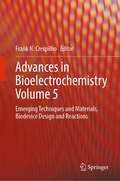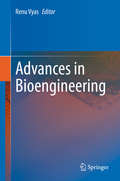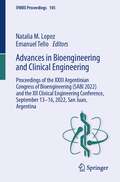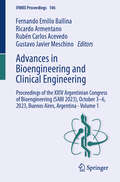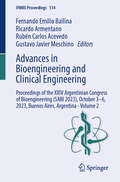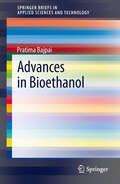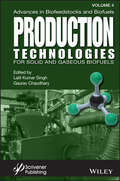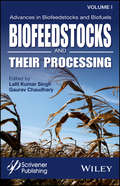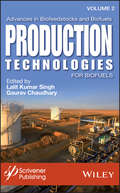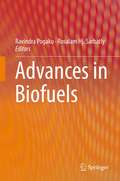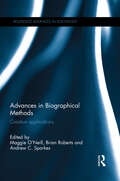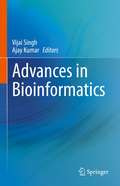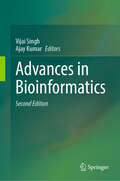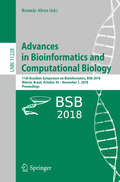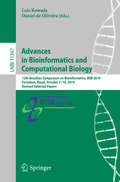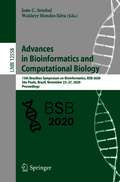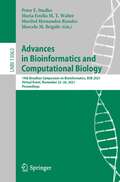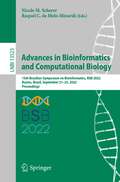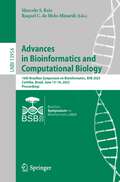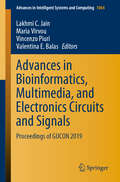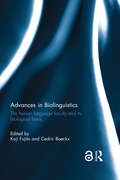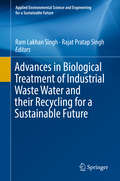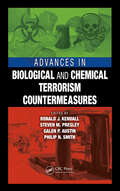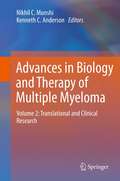- Table View
- List View
Advances in Bioelectrochemistry Volume 4: Biodevice, Bioelectrosynthesis and Bioenergy
by Frank N. CrespilhoThis book presents a collection of chapters on modern bioelectrochemistry focusing on new materials for biodevice, bioelectrosynthesis and bioenergy. The chapters cover protein engineering, semiconductors, biorecognition, graphene-based bioelectronics, bioelectrosynthesis, biofuel cells, bioinspired batteries and biophotovoltaics.
Advances in Bioelectrochemistry Volume 5: Emerging Techniques and Materials, Biodevice Design and Reactions
by Frank N. CrespilhoThis book presents a collection of chapters on modern bioelectrochemistry, showing different aspects of emerging techniques and materials, biodevice design and reactions. The chapters provide relevant bibliographic information for researchers and students interested in electrochemical impedance spectroscopy applied in biodevices, trends, and validation on impedimetric immunosensors in the application of routine analysis, electrochemical–surface plasmon bioanalytics and carbon nanomaterials in electrochemical biodevices, insights on inorganic complexes and metal based for biomarkers sensors, bioelectrodes and cascade reactions and field effect-based reactions.
Advances in Bioengineering
by Renu VyasThis book provides a single source of information on three major bioengineering areas: engineering at the cellular and molecular level; biomedical devices / instrument engineering; and data engineering. It explores the latest strategies that are essential to advancing our understanding of the mechanisms of human diseases, the development of new enzyme-based technologies, diagnostics, prosthetics, high-performance computing platforms for managing huge amounts of biological data, and the use of deep learning methods to create predictive models. The book also highlights the growing importance of integrating chemistry into life sciences research, most notably concerning the development and evaluation of nanomaterials and nanoparticles and their interactions with biological material. The underlying interdisciplinary theme of bioengineering is addressed in a range of multifaceted applications and worked out examples provided in each chapter.
Advances in Bioengineering and Clinical Engineering: Proceedings of the XXIII Argentinian Congress of Bioengineering (SABI 2022) and the XII Clinical Engineering Conference, September 13–16, 2022, San Juan, Argentina (IFMBE Proceedings #105)
by Natalia M. Lopez Emanuel TelloThis book offers a timely snapshot of research, technologies and best practices in the broad area of bioengineering and clinical engineering. Contributions report on advances in biomechanics, biomaterials, and tissue engineering, biosensors and instrumentation, biomedical signal processing, and rehabilitation engineering. Further, it covers topics relating to quality engineering and management of health services, and of engineering education. The book gathers selected, peer-reviewed contributions to the XXIII Argentinian Congress of Bioengineering and the XII Clinical Engineering Conference, both known under the acronym “SABI 2022”, held on September 13–16, 2022, in San Juan, Argentina, and organized by the Sociedad Argentina de Bioingeniería.
Advances in Bioengineering and Clinical Engineering: Proceedings of the XXIV Argentinian Congress of Bioengineering (SABI 2023), October 3–6, 2023, Buenos Aires, Argentina - Volume 1 (IFMBE Proceedings #106)
by Ricardo Armentano Fernando Emilio Ballina Rubén Carlos Acevedo Gustavo Javier MeschinoThis book offers a timely snapshot of research, technologies and best practices in the broad area of bioengineering and clinical engineering. It reports on advances in biomechanics, biomedical image processing, biomaterials and tissue engineering. Further, it covers applications of artificial intelligence in biology and medicine, and instrumentation. Gathering the first volume of the proceedings of the XXIV Argentinian Congress of Bioengineering (SABI 2023), held on October 3–6, 2023, in Buenos Aires, Argentina - and organised by the Sociedad Argentina de Bioingeniería, this book provides an extensive source of information for both researchers and professionals in biomedical and clinical engineering.
Advances in Bioengineering and Clinical Engineering: Proceedings of the XXIV Argentinian Congress of Bioengineering (SABI 2023), October 3–6, 2023, Buenos Aires, Argentina - Volume 2 (IFMBE Proceedings #114)
by Ricardo Armentano Fernando Emilio Ballina Rubén Carlos Acevedo Gustavo Javier MeschinoThis book offers a timely snapshot of research, technologies and best practices in the broad area of bioengineering and clinical engineering. Contributions report on advances in biomedical signal processing, biosystem models and 3D printing applications, clinical engineering, and neuromuscolar system analysis and rehabilitation engineering. They also cover developments in bioengineering education. Gathering the second volume of the proceedings of the XXIV Argentinian Congress of Bioengineering (SABI 2023), held on October 3–6, 2023, in Buenos Aires, Argentina - and organised by the Sociedad Argentina de Bioingeniería, this book provides an extensive source of information for both researchers and professionals in biomedical and clinical engineering.
Advances in Bioethanol (SpringerBriefs in Applied Sciences and Technology)
by Pratima BajpaiThe book provides an updated and detailed overview on advances in bioethanol. It looks at the historical perspectives, chemistry, sources and production of ethanol and discusses biotechnology breakthroughs and promising developments. The book also provides the details regarding the uses, advantages, problems, environmental effects and characteristics of bioethanol as a fuel. In addition, it presents information about ethanol in different parts of the world and also highlights the challenges and future of ethanol.
Advances in Biofeedstocks and Biofuels, Production Technologies for Solid and Gaseous Biofuels
by Gaurav Chaudhary Lalit Kumar SinghAdvances in Biofeedstocks and Biofuels PRODUCTION TECHNOLOGIES FOR SOLIDS AND GASEOUS BIOFUELS This latest volume in the series, “Advances in Biofeedstocks and Biofuels,” offers the most up-to-date and comprehensive coverage available for the production technologies for solid and gaseous biofuels. Biofuel production is one of the most extensively studied recent fields of innovation that can provide the world an alternative energy source. Biomass-based fuel production, or renewable fuels, are becoming increasingly important as a remedy for the increasing greenhouse effect, depleting oil reserves, and rising oil prices. Therefore, research on the production of various biofuels is gaining very much importance among scientists and researchers all over the globe. The book, Production Technologies for Solid and Gaseous Biofuels, is the fourth volume of the book series entitled “Advances in Biofeedstocks and Biofuels.” The first volume, Biofeedstocks and Their Processing, covered the aspects of biofeedstocks and their suitability as an alternative energy source. The second volume, Production Technologies for Biofuels, covered all the latest technologies in biofuels production. The third volume, Liquid Biofuel Production, focused on the latest technologies involved in the production of liquid biofuels, such as bioethanol, biodiesel, biobutanol, and others. This fourth volume, Production Technologies for Solid and Gaseous Biofuels, covers all of the latest technologies in the field of solid biofuels, like biochar, briquettes from biomass, as well as gaseous biofuels like biogas, biohydrogen, and more. Various aspects of utilization of waste biomass for the production of solid and gaseous biofuels are also discussed. This book presents the state of the art in solid and gaseous biofuel production, a must have for any engineer or scientist working in this field.
Advances in Biofeedstocks and Biofuels, Volume 1: Biofeedstocks and Their Processing
by Gaurav Chaudhary Lalit Kumar SinghBiofuels production is one of the most extensively studied fields in the energy sector that can provide an alternative energy source and bring the energy industry closer to sustainability. Biomass-based fuel production, or renewable fuels, are becoming increasingly important as a potential solution for man-made climate change, depleted oil reserves, and the dangers involved with hydraulic fracturing (or “fracking”). The price of oil will always be volatile and changeable, and, as long as industry and private citizens around the world need energy, there will be a need for alternative energy sources. The area known as “biofuels and biofeedstocks” is one of the most important and quickly growing pieces of the “energy pie.” But biofuels and biofeedstocks are constantly changing, and new processes are constantly being created, changed, and improved upon. The area is rapidly changing and always innovative. It is important, therefore, that books like the volumes in this series are published and the information widely disseminated to keep the industry informed of the state-of-the-art. This first volume in this groundbreaking new series is a collection of papers from some of the world’s foremost authorities on biofeedstocks and biofuels, covering biofeedstocks and how they are processed. It is a must-have for any engineer, scientist, technician, or student working in this area.
Advances in Biofeedstocks and Biofuels: Production Technologies for Biofuels
by Gaurav Chaudhary Lalit Kumar SinghBiofuels production is one of the most extensively studied fields in the energy sector that can provide an alternative energy source and bring the energy industry closer to sustainability. Biomass-based fuel production, or renewable fuels, are becoming increasingly important as a potential solution for man-made climate change, depleted oil reserves, and the dangers involved with hydraulic fracturing (or “fracking”). The price of oil will always be volatile and changeable, and, as long as industry and private citizens around the world need energy, there will be a need for alternative energy sources. The area known as “biofuels and biofeedstocks” is one of the most important and quickly growing pieces of the “energy pie.” But biofuels and biofeedstocks are constantly changing, and new processes are constantly being created, changed, and improved upon. The area is rapidly changing and always innovative. It is important, therefore, that books like the volumes in this series are published and the information widely disseminated to keep the industry informed of the state-of-the-art. This second volume in the Advances in Biofeedstocks and Biofuels series focuses on the production of biofuel, covering all of the major biofuels, such as biodiesel, biohydrogen, bioethanol, and others. This engaging text touches on all of the most important new processes and technologies, providing the most up-to-date coverage of the science available to industry. It is a must-have for any engineer or scientist working with biofuel technology.
Advances in Biofuels
by Rosalam Hj. Sarbatly Ravindra PogakuBiofuels will play a key role in the 21st century as the world faces two critical problems; volatile fuel prices and global climatic changes. Both of these are linked to the overdependence on the fossil fuels: petroleum, natural gas, and coal. Transportation is almost totally dependent on petroleum based fuels such as gasoline, diesel fuel, liquefied petroleum gas, and on natural gas. Despite a significant amount of research into biofuels, the field has not been able to replace fossil fuels. Recent advances will change this scenario. Extracting fuel from biomass has been very expensive (both monetarily and in land usage), time consuming, unusable byproducts, etc. Technology to obtain liquid fuel from non-fossil sources must be improved to be faster, more efficient and more cost-effective. This book will cover the current technology used for a variety of plant types and explore shortcomings with each.
Advances in Biographical Methods: Creative Applications (Routledge Advances in Sociology)
by Brian Roberts Andrew C. Sparkes Maggie O’NeillRooted in a long and diverse genealogy, biographical approaches have developed from a focus upon a single story, a ‘life story’ and personal documents (e.g. diaries), to encompass (more routinely) autobiographical secondary and archival research and analysis - as well as multi-media, arts based creative multi-sensory methods. Biographical Research and practices as part of human understanding helps people to make sense of what has been and what is happening in their lives, cultures, communities and societies. Advances in Biographical Methods: Creative Applications takes up these themes: theorising, doing and applying current advances in biographical methods. It demonstrates the momentum with which they areas are developing as a field of scholarship, especially in relation to creative innovations and applications, such as in new forms of interview and other practices, and debates on its interlinking with art, performance and digital methods.
Advances in Bioinformatics
by Ajay Kumar Vijai SinghThis book presents the latest developments in bioinformatics, highlighting the importance of bioinformatics in genomics, transcriptomics, metabolism and cheminformatics analysis, as well as in drug discovery and development. It covers tools, data mining and analysis, protein analysis, computational vaccine, and drug design. Covering cheminformatics, computational evolutionary biology and the role of next-generation sequencing and neural network analysis, it also discusses the use of bioinformatics tools in the development of precision medicine. This book offers a valuable source of information for not only beginners in bioinformatics, but also for students, researchers, scientists, clinicians, practitioners, policymakers, and stakeholders who are interested in harnessing the potential of bioinformatics in many areas.
Advances in Bioinformatics
by Ajay Kumar Vijai SinghThe second edition of Advances in Bioinformatics presents the latest developments in bioinformatics in gene discovery, genome analysis, genomics, transcriptomics, proteomics, metabolomics, metabolic flux analysis, drug discovery, and drug repurposing. It includes advancements in the applications of bioinformatics in the analysis of non-coding RNA, next-generation sequencing, genome-scale modelling, high throughput drug screening, precision medicine, automation and artificial intelligence, and machine learning. The chapter also summarizes the technologies and concepts that form the basis of this functional genomics approach. Additionally, the book highlights some of the areas in which bioinformatics resources and methods are being developed to support the drug discovery pipeline. The chapter also discusses the role of bioinformatics in modelling and simulations of molecular biology systems in pathways identification and design. It is a valuable source of information for beginners in bioinformatics and students, researchers, scientists, clinicians, practitioners, policymakers, and stakeholders who are interested in harnessing the potential of bioinformatics in biomedical and allied sciences.
Advances in Bioinformatics and Computational Biology: 11th Brazilian Symposium on Bioinformatics, BSB 2018, Niterói, Brazil, October 30 – November 1, 2018, Proceedings (Lecture Notes in Computer Science #11228)
by Ronnie AlvesThis book constitutes the refereed proceedings of the 11th Brazilian Symposium on Bioinformatics, BSB 2018, held in Rio de Janeiro, Brazil, in October/November 2018. The 13 revised full papers presented were carefully reviewed and selected from 26 submissions. The papers cover all aspects of bioinformatics and computational biology.
Advances in Bioinformatics and Computational Biology: 12th Brazilian Symposium on Bioinformatics, BSB 2019, Fortaleza, Brazil, October 7–10, 2019, Revised Selected Papers (Lecture Notes in Computer Science #11347)
by Luis Kowada Daniel De OliveiraThis book constitutes the refereed proceedings of the Brazilian Symposium on Bioinformatics, BSB 2019, held in Fortaleza, Brazil in October 2019. The 9 revised full papers and 3 short papers were carefully reviewed and selected from 22 submissions. The papers address a broad range of current topics in computational biology and bioinformatics.
Advances in Bioinformatics and Computational Biology: 13th Brazilian Symposium on Bioinformatics, BSB 2020, São Paulo, Brazil, November 23–27, 2020, Proceedings (Lecture Notes in Computer Science #12558)
by João C. Setubal Waldeyr Mendes SilvaThis book constitutes the refereed proceedings of the Brazilian Symposium on Bioinformatics, BSB 2020, held in São Paulo, Brazil, in November 2020. Due to COVID-19 pandemic the conference was held virtually The 20 revised full papers and 5 short papers were carefully reviewed and selected from 45 submissions. The papers address a broad range of current topics in computational biology and bioinformatics.
Advances in Bioinformatics and Computational Biology: 14th Brazilian Symposium on Bioinformatics, BSB 2021, Virtual Event, November 22–26, 2021, Proceedings (Lecture Notes in Computer Science #13063)
by Peter F. Stadler Maria Emilia M. T. Walter Maribel Hernandez-Rosales Marcelo M. BrigidoThis book constitutes the refereed proceedings of the Brazilian Symposium on Bioinformatics, BSB 2021, held in November 2021. Due to COVID-19 pandemic the conference was held virtually The 10 revised full papers and 5 short papers were carefully reviewed and selected from 28 submissions. The papers address a broad range of current topics in computational biology and bioinformatics.
Advances in Bioinformatics and Computational Biology: 15th Brazilian Symposium on Bioinformatics, BSB 2022, Buzios, Brazil, September 21–23, 2022, Proceedings (Lecture Notes in Computer Science #13523)
by Nicole M. Scherer Raquel C. de Melo-MinardiThis book constitutes the proceedings of the 15th Brazilian Symposium on Bioinformatics on Advances in Bioinformatics and Computational Biology, BSB 2022, which took place in Buzios, Brazil, in September 2022. The 10 full papers and 7 short papers presented in this volume were carefully reviewed and selected from 23 submissions. The papers focus on bioinformatics, computational biology, Biological Databases, Biological Networks, Cheminformatics, Evolutionary Genomics, Computational Proteomics, Systems Biology, Drug Design, Genomics, Machine Learning applications in Bioinformatics, Metagenomics, Molecular Docking and Modeling, Molecular Evolution and Phylogenetics, Protein Structure and Modeling, Proteomics, Transcriptomics, Single-Cell Analysis, Workflows in Bioinformatics.
Advances in Bioinformatics and Computational Biology: 16th Brazilian Symposium on Bioinformatics, BSB 2023, Curitiba, Brazil, June 13–16, 2023, Proceedings (Lecture Notes in Computer Science #13954)
by Raquel C. de Melo-Minardi Marcelo S. ReisThis book constitutes the proceedings of the 16th Brazilian Symposium on Bioinformatics on Advances in Bioinformatics and Computational Biology, BSB 2023, which took place in Curitiba, Brazil, in June 2023. The 11 full papers and 3 short papers presented in this volume were carefully reviewed and selected from 24 submissions. The papers focus on bioinformatics, computational biology, Biological Databases, Biological Networks, Cheminformatics, Evolutionary Genomics, Computational Proteomics, Systems Biology, Drug Design, Genomics, Machine Learning applications in Bioinformatics, Metagenomics, Molecular Docking and Modeling, Molecular Evolution and Phylogenetics, Protein Structure and Modeling, Proteomics, Transcriptomics, Single-Cell Analysis, Workflows in Bioinformatics.
Advances in Bioinformatics, Multimedia, and Electronics Circuits and Signals: Proceedings of GUCON 2019 (Advances in Intelligent Systems and Computing #1064)
by Lakhmi C. Jain Vincenzo Piuri Maria Virvou Valentina E. BalasThe book features selected high-quality papers presented in International Conference on Computing, Power and Communication Technologies 2019 (GUCON 2019), organized by Galgotias University, India, in September 2019. Discussing in detail topics related to electronics devices, circuits and systems; signal processing; and bioinformatics, multimedia and machine learning, the papers in this book provide interesting reading for researchers, engineers, and students.
Advances in Biolinguistics: The Human Language Faculty and Its Biological Basis
by Koji Fujita and Cedric BoeckxBiolinguistics is a highly interdisciplinary field that seeks the rapprochement between linguistics and biology. Linking theoretical linguistics, theoretical biology, genetics, neuroscience and cognitive psychology, this book offers a collection of chapters situating the enterprise conceptually, highlighting both the promises and challenges of the field, and chapters focusing on the challenges and prospects of taking interdisciplinarity seriously. It provides concrete illustrations of some of the cutting-edge research in biolinguistics and piques the interest of undergraduate students looking for a field to major in and inspires graduate students on possible research directions. It is also meant to show to specialists in adjacent fields how a particular strand of theoretical linguistics relates to their concerns, and in so doing, the book intends to foster collaboration across disciplines. Chapter 1 of this book is freely available as a downloadable Open Access PDF at http://www.taylorfrancis.com under a Creative Commons Attribution-Non Commercial-No Derivatives (CC-BY-NC-ND) 4.0 license.
Advances in Biological Treatment of Industrial Waste Water and their Recycling for a Sustainable Future (Applied Environmental Science And Engineering For A Sustainable Future Ser.)
by Ram Lakhan Singh Rajat Pratap SinghWith rampant industrialization, the management of waste generated by various industries is becoming a mammoth problem. Wastewater discharges from industrial and commercial sources may contain pollutants at levels that could affect the quality of receiving waters or interfere with potable water supplies. Thousands of small and large-scale industrial units dump their waste, which is often toxic and hazardous, in open spaces and nearby water sources. Over the last three decades, many cases of serious and permanent damage to the environment and human health on the part of these industries have come to the fore. This book mainly focuses on the biological treatment of wastewater from various industries, and provides detailed information on the sources and characteristics of this wastewater, followed by descriptions of the biological methods used to treat them. Individual chapters address the treatment of wastewater from pulp and paper mills; tanneries; distilleries, sugar mills; the dairy industry; wine industry; textile industry; pharmaceutical industry; food processing industry; oil refinery/petroleum industry; fertilizer industry and beverage/ soft drink bottling industry; and include the characteristics of wastewater, evaluation of biological treatment methods, and recycling of wastewater. Easy to follow, with simple explanations and a good framework for understanding the complex nature of biological wastewater treatment processes, the book will be instrumental to quickly understanding various aspects of the biological treatment of industrial wastewater. It will serve as a valuable reference book for scientists, researchers, educators, and engineers alike.
Advances in Biological and Chemical Terrorism Countermeasures
by Ronald J. Kendall Steven M. Presley Galen P. Austin Philip N. SmithBiological and chemical weapons are a growing terrorist threat to the United States and other nations and countermeasures continue to evolve as a national and global priority issue. To keep up with this rapidly changing and vital field we must establish the current state-of-the-science on countermeasures to form a platform from which to offer persp
Advances in Biology and Therapy of Multiple Myeloma, Volume 2: Volume 2: Translational and Clinical Research
by Nikhil C. Munshi Kenneth C. AndersonDespite the advances in conventional, novel agent and high dose chemotherapy multiple myeloma (MM) remains incurable. In order to overcome resistance to current therapies and improve patient outcome, novel biologically-based treatment approaches are being developed. Current translational research in MM focusing on the development of molecularly-based combination therapies has great promise to achieve high frequency and durable responses in the majority of patients. Two major advances are making this goal possible. First, recent advances in genomics and proteomics in MM have allowed for increased understanding of disease pathogenesis, identified novel therapeutic targets, allowed for molecular classification, and provided the scientific rationale for combining targeted therapies to increase tumor cell cytotoxicity and abrogate drug resistance. Second, there is now an increased understanding of how adhesion of MM cells in bone marrow (BM) further impacts gene expression in MM cells, as well as in BM stromal cells (BMSCs). As a result of these advances in oncogenomics on the one hand and increased understanding of the role of the BM in the pathogenesis of MM on the other, a new treatment paradigm targeting the tumor cell and its BM microenvironment to overcome drug resistance and improve patient outcome has now been developed. Thalidomide, lenalidomide, and Bortezomib are three agents which target the tumor cell in its microenvironment in both laboratory and animal models and which have rapidly translated from the bench to the bedside. Ongoing efforts are using oncogenomics and cell signaling studies to identify next generation of therapies in MM on the one hand, and to inform the design of combination trials on the other. This new paradigm for overcoming drug resistance and improving patient outcome in MM has great promise not only to change the natural history of MM, but also to serve as a model for targeted therapeutics directed to improve outcome of patients with MM.

